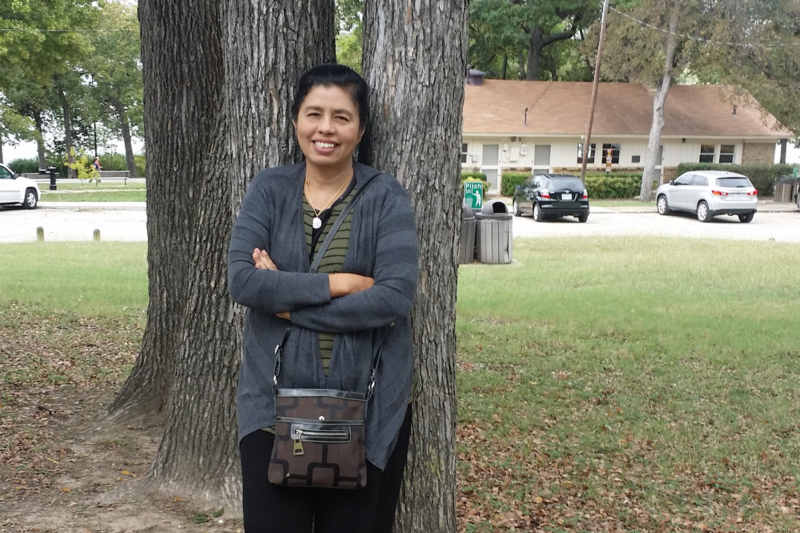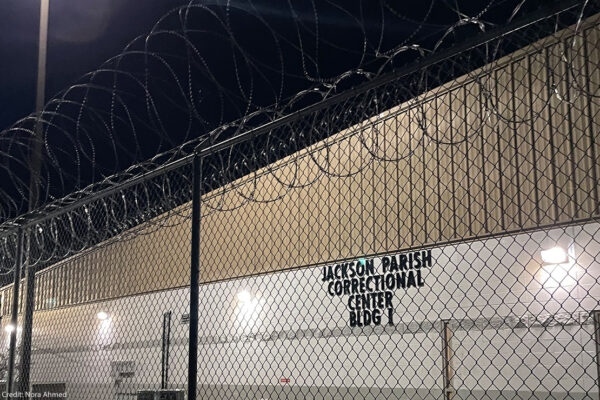I’m a Refugee. In America, I Felt Safe for the First Time. Now All I Feel Is Fear.


In the third piece in the series, “Waking Up in Trump’s America,” Sharefa Daw, a refugee from Burma, discusses her fear that the Trump administration will limit the number of refugees the U.S. resettles while creating a suffocating atmosphere of hate and fear.
I now live in Dallas, Texas, about 9,000 miles away from where I was born in Southeast Asia. My husband and I came to Dallas as refugees with our three kids — and for the first time in our lives, we felt safe. But during Donald Trump’s election campaign, I stopped feeling safe anymore. I worry that President Trump will lead with hate and fear, and our neighbors will follow his example in ways that hurt my family.
Back in Burma, in the city of Rangoon, I was a teacher and my husband, Haroon, sold condensed milk he transported from the countryside. We had both studied biology and zoology in university, but the government barred us from entering certain professions because we were Muslims — we were second-class citizens. Haroon started going to meetings with pro-democracy activists.
One day in 1999, when our kids were still young, Haroon heard that the security forces were looking for him. If he were arrested, we both knew he would be tortured and killed. He said he had to go away, into hiding. I knew I had to be strong and let him go.
After he left, security agents started knocking on our door at midnight, asking where he was. I told the truth: I had no idea. He didn’t contact me, to keep me safe.
A few years later, I heard he had escaped to a border town in Thailand. I packed my three kids onto a bus. We stayed overnight near the border, then took a boat across the Siam River. Through the whole trip, my heart was pounding. I held my youngest son; my oldest son held his sister. I never showed the kids my weak face — I had to be strong. I told my children: Pray inside your heart but not out loud. Finally, we arrived in Thailand.
Every day, I took my kids out with me to show people Haroon’s picture and ask if they knew him. Eventually, I found him in a tea shop. My daughter ran into his arms, and Haroon started to cry. I didn’t have any more tears.
Haroon worked teaching about democracy, and I got a job conducting trainings on HIV and AIDS. Burmese children were not allowed to go to the local school, so I told my kids to set up an informal school at our place and teach neighborhood kids to read and write. Sometimes we didn’t have enough food. My oldest son would always wait until his younger sister and brother ate. My husband would make sure I ate before him.
We applied to the United Nations for refugee status. Later, we moved to a refugee camp. Then U.N. officials asked where we wanted to resettle and offered us a choice of countries.

Sharefa Daw, left, with a friend’s family in a refugee camp in Thailand.
I didn’t want to move far away. I thought someday the Burmese government would change and we’d go home. But we couldn’t stay in Thailand, and my husband said, “I want to go to the United States — we lost everything fighting for freedom and democracy, and now I want to live in freedom and democracy.”
It took more than two years of interviews and background checks, but we learned we were accepted to the U.S.
It was 2 a.m. when we landed at the airport in Dallas in August 2005. I will never forget that feeling. I was overjoyed. I finally felt I had a place in this world.
The first month was like a honeymoon. We got a home; we could buy food. Within a month, my husband found a job preparing packages for shipping for $7.25 an hour. He was so happy.
I was the only one in the family who already spoke some English, and I started advanced classes at the community college and also learned Excel and PowerPoint. My children would ask me for help with their homework. I told them, “You have your own dictionary. Look up the words and figure it out.” I was teaching them how to survive.
I started to volunteer with the International Rescue Committee, the organization that resettled my family. Three months after our arrival, right when our government support money ran out, I got a job doing computer inventory.
Not long after, the IRC offered me a job. I started as an assistant caseworker and kept getting promotions. In 2015, I became a senior caseworker. Now I tell newcomers, “If you take it seriously and work very hard, this country will give you the opportunity to grow. You can accomplish anything.”
My children all went to college. My daughter became an elementary school teacher. My oldest son works as an IT specialist. My youngest son, who was only 11 when we arrived here, is now 6 feet 4 inches tall. He’s almost a foot taller than his father and the tallest in our family — maybe because he had more growing years with good American food. He works in tech support for T-Mobile.
We look like an American success story. But when we started hearing the anti-Muslim hate during the presidential election campaign, my husband said, “My name is Haroon. Your name is Sharefa. Should we change our names?” He said, “What if we have to leave the United States?” We had already given up our Burmese citizenship — this is our only home. He was afraid people would know I was a Muslim refugee, and he said, “Be careful wherever you go.”
Last spring, my son got engaged. We were planning to hold a wedding reception for 150 friends at our house. But I was afraid that our neighbors would see our visibly Muslim friends coming over and think it was some kind of ISIS meeting. We decided the only day we could host the reception was Thanksgiving Day, when our neighbors would probably be away.
There have been hate crimes in Dallas. The Syrian refugees coming to the United States now ask to live near other Syrians “so we can protect each other.”
Our new president’s hateful speech has helped create a more hateful country. But refugees are not dangerous or lazy. We are normal people who are unable to live in our own countries.
I worry that under President Trump, the IRC, which has been resettling refugees for decades, will scale back its work and help fewer people whose lives depend on it. And I’ve been planning what to do if I lose my job.
We didn’t want to leave our home. But we came here and came to love America. This is the American story, and we’re part of it. I hope Americans under President Trump will see us for who we are.


